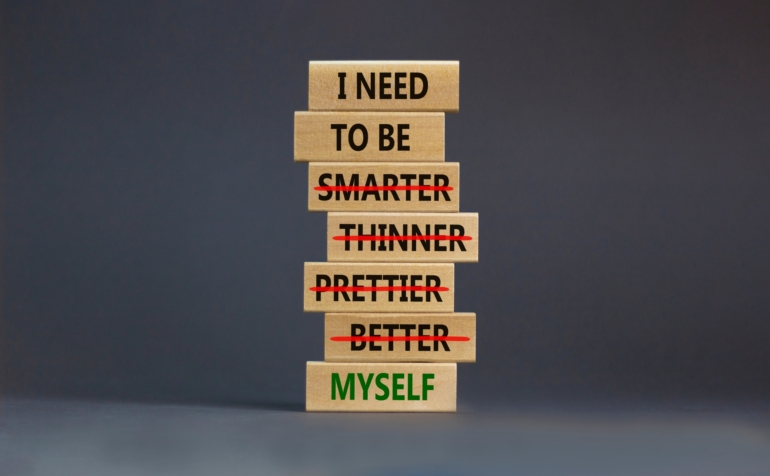Someone once asked me why I think so many people are chronically stressed and unhappy despite having financial and career stability. I said that it’s part of human nature to engage in mental and behavioral activities that make us miserable. Being miserable is partly a self-inflicted wound. So, today I start a new series that focuses on the behaviors we engage in that inadvertently add to our stress and unhappiness. Note that my focus is on activities we have control over. It makes no sense and is counterproductive to tell a depressed person to “just snap out of it.” It does make sense to suggest to anyone that a demoralizing behavior that is under conscious control can be altered or stopped altogether.
Today I present Method A which is “Stop Labeling Yourself.” Let me explain in three parts: 1) what is the conceptualized self, 2) why it hurts us to have too rigid and not inclusive enough sense of self, and 3) how to achieve greater self-acceptance.
The Conceptualized Self
Through the course of our lives we develop a conceptualized self, that is, a series of self-beliefs about who we are and would like to be. The problem arises not because these self-labels are wrong or that our ideals are misguided because often they are not. Rather the problems with the conceptualized self are:
- It is incomplete because it often ignores or rejects the parts of ourselves that don’t fit this established notion of ourselves, a notion that reflects many expectations we’ve internalized from our family of origin and of society at large. We are complex creatures with many strengths, weaknesses, quirks, values, drives, desires, and fears. When our conceptualized self is not all-inclusive of all aspects of ourselves, it in effect forms an internal boundary, with an inside and an outside. Those parts of ourselves that align with our self-concepts are accepted and the parts of ourselves that do not align with it we ignore or reject. Often, but not always, our self-concept represents an ideal, comprised exclusively of positive and even heroic self-beliefs and, often but not always, the rejected or unacknowledged parts of ourselves represent what we’ve learned to label as weak, sinful, disgusting, shameful, and so forth.
- Another problem is that our split selves war against each other: we try to maintain our established self-labels and keep ignoring or rejecting the unacceptable parts of ourselves, which just don’t go away. For example, despite our ideal sense of ourselves, as kind, winners, and hard workers, we’re still going act like jerks, fail, act lazy, etc. This internal split causes chronic tension and even an ongoing vigilance to keep ignoring or rejecting the unwanted parts of ourselves.
- This leads to a rigid self-concept, one that feels under siege. A rigid self-concept does not allow for changes even when the world, our life circumstances, and our selves have changed.
Here is the good news. The self-concept is not unconscious. You don’t need psycho-analysis or hypnosis to discover it. It takes simple ongoing self-reflection to recognize the labels we’ve come to live with. And it takes self-compassion to accept those parts of ourselves we’d rather not have. The goal of greater self-acceptance is a more inclusive and flexible self-concept and an observing self that is more compassionate towards all parts of ourselves.
Common beliefs about ourselves that can box us in include, “I’m one of the smartest people I know, I’ll outwork anyone, I never give up, I’m strong, I don’t take shit from anyone, I’m reliable, I’m honest, I’m loyal, I’m kind, I’m beautiful. I’m a winner. I’m a devoted parent, I love my job. I deserve this.” Well, every one of those beliefs about yourself may be true to some degree. But they’re often stated as absolutes and disallow recognition of the truth of their opposites.
If you self-reflect you might admit that sometimes you’re not reliable, that you’re not as smart or hard-working as you’d like to believe, that you loathe certain patients, that you’d rather not be working but raising kids instead, or that you’d rather be working and not spending the majority of the day with kids. One of the most provocative ideas to accept about yourself may be that you just do not prefer the company of young children.
So yes, you’re kind until you’re not; you’re strong unless you’re weak; you’re a devoted parent except when you’re not; you’re a winner until you lose. Perhaps you’ve spent decades believing you can handle anything for everyone until you reach a certain age and your body breaks down and you discover you can’t be a caretaker to the world anymore. Will you have the strength to let others care for you? Do you see now that self-acceptance can subvert many of your most cherished beliefs about yourself? And do you see what large doses of self-compassion may be needed?
This discussion would be incomplete if I didn’t focus on the obverse of questioning one’s ideals about oneself, and that is to question one’s self-deprecating beliefs. We can also have beliefs that we are ugly, not capable, not worthy of success, not good at math or science or good with people, or doomed to a difficult or loveless life. It may be that perhaps for you the greater task is to challenge these limiting self-concepts and be forced to face the responsibility of working toward greater success or happiness. Thus, perhaps ironically, our self-concept is often an amalgam of overly negative and overly idealized self-beliefs. What they have in common is they exclude the possibility of their opposites and become unchangeable.
The Benefits of a More Inclusive Self-Concept
Imagine you’re a college coach for a sport of your choosing. You are looking to recruit promising high school athletes. Would you want to know only about these athletes’ strengths, or about their strengths, weaknesses, quirks, habits, mindsets, and anything else you can think of? Clearly, to be an effective coach you need to know as much as possible about each person so that you can build the strengths and address the weaknesses with a personalized approach. Thus, I submit that self-knowledge is empowering and leads to the making of more aligned life decisions. After all, the quality of a decision is affected by the quality of the knowledge one weighs when making that decision.
And perhaps most importantly, you need an ally. If you’re at war with yourself, then who is there to support all of you? It must be you. If you don’t acknowledge parts of yourself, then who will? If you can’t show compassion towards those parts of yourself you dislike or hate or are disgusted by, then who will be able to?
I’m asking nothing more than that you show yourself the same level of understanding and compassion that you would to a friend… to a stranger even.
How to Develop a More Flexible Self-Concept
As I’ve laid out the idea of the conceptualized self and the ways and reasons we ignore parts of ourselves, it becomes clear that the road to full self-acceptance can be challenging. Here are ways to make it happen if you’re inclined.
- You don’t need to share any of your thoughts or new beliefs about yourself with anyone. You can choose if, when, and with whom you want to discuss these issues. They’re private.
- Just because you come to acknowledge some aspect of yourself you were previously ignoring or rejecting does not mean you need to act on this acceptance. For example, if you admit that you did not want to become a parent, or you don’t like raising kids, doesn’t permit you to neglect your kids because they still deserve the best parent they can get. Or if you admit that some of your patients are self-righteous self-absorbed blow-hards who never adhere to any treatment, does not permit you to act counter-therapeutically towards them. I believe that being able to admit to these difficult feelings and/or beliefs can lead to greater acceptance of a disliked role or job and greater kindness towards people we don’t like. With clarity, we can gain a greater understanding of our motivations for how we think, feel, and act. We’ve strengthened our powers of self-observation and self-reflection.
- By being more accepting of your weaknesses does not mean that you will become more unreliable, lazy, unkind, etc. You still have your values and you should continue to strive to live by them. You can change “I’m kind” into “I strive to be kind and when I’m not I will reflect.” Or rather than “I’m strong” you can think, “I strive to be a strong, successful, hardworking person. When I’m not I’ll reflect and learn from my shortcomings.”
- If your consideration of ignored or rejected aspects of yourself is emotionally provocative or may lead to some change in personal or career direction, you can seek out support – from a friend, family member, clergy, psychotherapist, or support group. Some journeys are better taken with someone who functions as an emotional support, sounding board, and guide.
- Self-acceptance is a process, one might say, a process that lasts an entire lifetime. Adding in a little more self-acceptance, and a little more flexible views of one’s self is good. It’s not an all-or-nothing project and it isn’t achieved in a day.
Thanks. Until next time.
Dr. Jack
LanguageBrief
“The worst loneliness is to not be comfortable with yourself.” – Mark Twain
“I don’t know if I continue, even today, always liking myself. But what I learned to do many years ago was to forgive myself. It is very important for every human being to forgive herself or himself because if you live, you will make mistakes – it is inevitable.” – Maya Angelou
“The difference between my darkness and your darkness is that I can look at my own badness in the face and accept its existence while you are busy covering your mirror with a white linen sheet.” – C. JoyBell C.







Leave A Comment